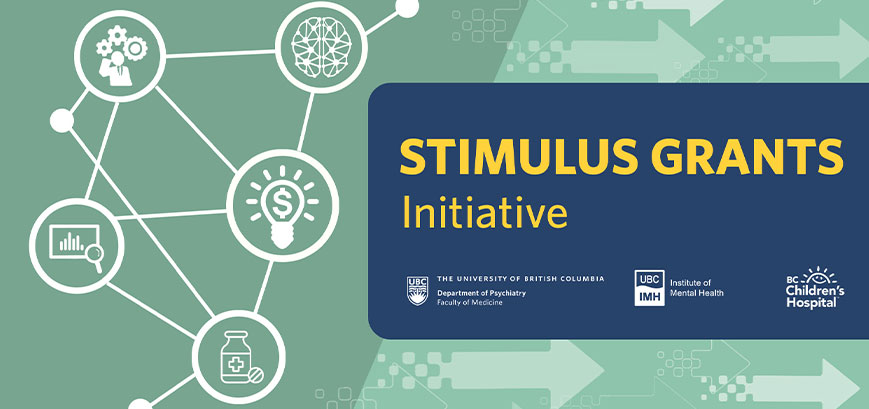
About the Stimulus Grants Initiative
The UBC Department of Psychiatry, in partnership with the UBC Institute of Mental Health (UBC IMH) and BC Children’s Hospital, have launched the Stimulus Grants Initiative, which aims to increase research capacity and support for clinicians and for junior academics who wish to undertake:
- Small, self-contained studies without other funding
- Pilot studies toward the pursuit of more comprehensive initiatives and/or grant applications
Accepting applications from June 1st to October 1st each year. The application period is now closed for 2023.
Granting Streams
The Stimulus Grant Initiative comprises three streams:
- Stimulus-Clinician Grant
- Stimulus-Junior Academic Grant
- Stimulus-Child & Youth Mental Health Grant.
Eligibility Criteria
Applications to each stream will be assessed separately based on criteria that embrace equity, diversity, and inclusion in addition to scientific merit.
The proposed projects in the Clinician and Junior Academic Streams can be on any topic that is directly related to mental health.
The Stimulus-Child & Youth Mental Health Stream is sponsored by the BC Children’s Hospital Chair in Pediatric Mental Health, and proposed projects should focus exclusively on topics that are related directly to child and adolescent mental health.
Stream-Specific Eligibility Criteria for the Principal Applicant
Stimulus-Clinician Grant
The principal applicant:
- Must have a clinical, non-academic position
- Can be at any career stage including being a resident in the General Track of the UBC Psychiatry Residency Program.
- Must have a primary affiliation with the UBC Department of Psychiatry
Stimulus-Junior Academic Grant
The principal applicant:
- Can be a Postdoctoral Fellow, Research Associate/Scientist, Assistant Professor (academic or partner track), or Resident in the Research Track of the UBC Psychiatry Residency Program.
- Must have a primary Affiliation with the UBC Department of Psychiatry
Stimulus-Child & Youth Mental Health Grant
The principal applicant:
- Can have a clinical, non-academic position at any career stage including residents in the main or research track
- Can be a Postdoctoral Fellow, Research Associate/Scientist, or Assistant Professor (academic or partner track)
- Must be connected to the BC Children’s Hospital Healthy Minds Centre
Eligibility Criteria Common to all Streams
- Each application must have only ONE principal applicant fulfilling the criteria shown above
- Each application must have only ONE co-applicant; the co-applicant must be an Assistant, Associate or a Full Professor at the UBC Department of Psychiatry
- Each application can have multiple collaborators; collaborators can be clinicians or academics of any stage and may be from any UBC department or any institution in Canada or abroad
- Both the principal applicant and the co-applicant must confirm that no other funding is available or pending for the proposed project at the time of submission; the Stimulus Grants cannot be used to supplement existing funding
- Maximum duration of each proposed project: 24 months
- Maximum budget for each Project: $20,000 covering only eligible costs
- The same application cannot be submitted to more than one of the Stimulus Initiative Streams
Evaluation Criteria
Download Evaluation Criteria here.
Scoring Guidance
Applications are scored in 4 domains: (1) Quality of the Applicant; (2) Project Significance; (3) Project Methodology; (4) Project Feasibility. Reviewers are asked to judge the quality of the application based only on the information provided.
| Scoring Guidance for All Domains | ||
| Score | Descriptor | Additional Guidance |
| 1 | Exceptional | Exceptionally strong with essentially no weaknesses |
| 2 | Outstanding | Extremely strong with negligible weaknesses |
| 3 | Excellent | Very strong with few minor weaknesses |
| 4 | Very Good | Strong but with numerous minor weaknesses |
| 5 | Good | Strong but with at least one moderate weakness |
| 6 | Satisfactory | Some strengths but also multiple weaknesses |
| 7 | Fair | Some strengths but with at least one major weakness |
| 8 | Marginal | Some strengths but also multiple major weaknesses |
| 9 | Poor | Very few strengths and multiple major weaknesses |
Criteria Considered
Quality of Applicant:
- The track record and scientific ability of the applicant, as reflected in their application
- Experience relevant to the topic of the application
- Confidence that they will carry out the proposed research project successfully.
- Additional criteria for applicants in the academic stream: (i) publication and grants relative to career stage; (ii) showing early leadership.
Project Significance:
- Does the project address an interesting topic for which there is limited available information?
- Based on the available literature, is this project redundant or of minor incremental value?
- Will the results contribute significantly to our understanding of mental disorders OR to the improvement of clinical care?
- If the aims of the project are achieved, how will scientific knowledge, technical capability, and/or clinical practice be improved?
- For academic stream only: (i) is this project likely to assist the applicant’s career development? (ii) is the project likely to provide data for a grant application to external agencies?
Project Methodology:
- Are there ethical issues, and if so have these been adequately addressed?
- Is the methodology clearly described?
- Are the overall strategy, methodology, and analyses well-reasoned and appropriate?
- Is the study sufficiently powered to achieve the stated aims?
Project Feasibility:
- Are the aims achievable within the timeframe proposed?
- Is there evidence of the feasibility of participant recruitment (if appropriate)?
- Is the proposed research project achievable with the infrastructure and other resources as detailed by the applicant?
- Are the listed collaborators appropriate in terms of their expertise?
Eligible Costs
Eligible Costs
- Salary support for the Principal Applicant
- Salary support for personnel essential for conducting the study (other than the Principal Applicant); can include salary support for research assistant or technician
- Lab costs or neuroimaging costs essential for the project
- Equipment or software licenses that are necessary for the project
- Cost of animal care/procurement if essential for the project
- Participant reimbursement essential for the project
- Expenses for training courses if essential for the project
- Travel expenses for the Principal Applicant if essential for the project (e.g., for data collection or training) (excludes any conference attendance)
- Expenses to cover open-access publishing for work resulting directly from the project (up to 3500 USD per article)
Non-Eligible Costs
- Salary support for the Co-Applicant or the Collaborators
- Any travel expenses for the Co-Applicant or Collaborators
- General equipment (e.g., laptops, personal computers)
- Any expenses associated with attendance at scientific conferences (i.e., registration, accommodation, travel fares)
Application Guidelines
Each Application Package must include:
A three-page APPLICANT PROFILE for each principal applicant (max. 2). Download and edit the PDF template
A three-page PROJECT PROPOSAL. Download and edit the PDF template
Please submit your application package as a single PDF document to Margaret Koshi at margaret.koshi@ubc.ca. Only applications using the templates provided will be considered. Should you have any specific questions about the Stimulus Grants, please direct them to Dr. Sophia Frangou at sophia.frangou@ubc.ca.
Application Timeline
Each year, applications for the Stimulus Grant Initiatives will be accepted between June 1st and October 1st.
FAQs for Stimulus Grants
I am not a member of the UBC Department of Psychiatry. Can I submit a Stimulus Grant as a principal applicant or as a co-applicant?
NO. These grants are only available to applicants and co-applicants who are members of the UBC Department of Psychiatry or are part of the Division of Child and Adolescent Psychiatry at BC Children’s Hospital.
As a principal applicant, can I submit more than one application?
YES. You can submit multiple applications, but it would be advisable to focus on one well-written and well-conceived project.
As a principal applicant, can I submit the same application to more than one stream?
NO. The same application cannot be submitted to more than ONE stream.
Can my application have more than one principal applicant and more than one co-applicant?
NO. Each application shall have ONE principal applicant and ONE co-applicant.
Can I be a co-applicant on more than one application?
YES. There is no limitation to the number of applications that a faculty member can support as a co-applicant.
Can I have collaborators from outside of the UBC Department of Psychiatry?
YES. Collaborators can be affiliated with any Department, Institution, advocacy group or industry partners withinand outside Canada.
Can I have multiple collaborators?
YES. There is no formal limit, but the inclusion of collaborators should be justified, and their contribution to the project should be clearly articulated.
I want to submit an application as a principal applicant, but I plan to leave UBC in the near future. Can I take the grant money with me to my new institution?
NO. The Stimulus Grant money cannot be transferred to another institution.
I want to submit an application as a principal applicant but I plan to move to another UBC Department. Can I take the grant money with me to my new UBC Department?
NO. The Stimulus Grant money cannot be transferred to another UBC Department
I want to submit an application as a principal applicant but I plan to leave UBC in the near future. Can I transfer the grant money to another person within the UBC Department of Psychiatry?
NO. The grant money cannot be transferred to the co-applicant or any other member of the Department.
Can my project use data already collected through another study?
YES. However, the analyses you proposed should be a significant conceptual departure from the initial study, not an add-on. For example, looking at sex differences in an acquired sample would be considered an add-on analysis as the original study should have already considered or modeled sex.
Do I have to ask for the maximum budget allowable?
NO. The budget should be justified and meet the actual needs of the project. For example, if your salary is covered and you are analysing legacy data, you can ask for money for one or two open-access publications.
Are there any rules as to how to structure my budget?
NO. You can structure your budget as most appropriate for your project, but you should only include eligible cost items (the list is available on our website) and you should stay within the maximum allowable total budget.
I was awarded a Stimulus Grant. Can I defer starting this for a year or more?
NO. You must start your project within 6 months (max) from award. There is some discretion in the case of unforeseen major personal (e.g., illness) or societal (e.g., pandemic) events that are reasonably expected to impact your ability to conduct your project.
I plan to be away from UBC for a period of time, during the period I should be starting my grant. Can I defer it?
NO. The award cannot be deferred in the case of pre-planned periods of absence.
Meet Our 2022/2023 Awardees

Dr. Michael Song
PGY1 Resident
Recipient of the Stimulus-Clinician Grant
Epigenetic markers for adverse childhood experiences among complex concurrent psychiatric disorders: a pilot study

Dr. Heather Palis
Postdoctoral Fellow
Recipient of the Stimulus-Junior Academic Grant
Examining ten-year trends of ADHD diagnosis and treatment in British Columbia among people with concurrent substance use disorders and history of incarceration

Dr. Clara Westwell-Roper
Child & Adolescent Psychiatry Subspecialty Resident
Recipient of the Stimulus-Child and Youth Mental Health Grant
Longitudinal variation in markers of stress and inflammation in youth with obsessive-compulsive disorder and their parents participating in group family-based cognitive behavioural therapy

Dr. Ruiyang Ge
Research Associate
Recipient of the Stimulus-Child and Youth Mental Health Grant
Individual-Level Deviations from Normative Neuroanatomical Models in Youth with Mood Disorders